As residents of Benghazi, Libya, marked the anniversary of Libya’s revolution on Feb. 19, the head of the city’s diminished Catholic community spoke of a need to rebuild his congregation and of the uncertainties ahead. “Thank God everything passed peacefully,” said Bishop Sylvester Magro after a Mass attended by just a few dozen worshipers, most of them Filipinos. Beyond the gates of the Church of the Immaculate Conception, the city’s Mediterranean-facing boulevards were crammed with thousands of revelers, guarded by heavily armed militia and a fledgling black-clad police force. Libya is an almost entirely Muslim country, with Christianity restricted to enclaves of foreign workers. Benghazi was once home to a 2,000-strong Catholic community. Now just 300 Catholics remain. Despite the official end to the war in late October and the return of relative security in eastern Libya, Bishop Magro said Catholic migrants are only slowly returning. The prospect of a new, more Islamic government for Libya has raised some concerns over future restrictions on the country’s Christian communities.
Rebuilding Libya
Show Comments (
)
Comments are automatically closed two weeks after an article's initial publication. See our comments policy for more.
The latest from america
At a Mass for the Jubilee of Youth outside Rome, Pope Leo exhorted over a million young people to be "seeds of hope" and a "sign that a different world is possible."
Perhaps it is the hard-won wisdom that comes with age, but the Catholic rituals and practices I once scorned are the same rituals and practices that now usher me into God's presence, time and time again.
"Only through patient and inclusive dialogue" can "a just and lasting conflict resolution can be achieved" in the long-running conflict between Israelis and Palestinians, said the Holy See's permanent observer to the United Nations.
The ”Bad Guys” films ask, how do we determine who the “bad guys” are? And if you’re marked as “bad” from the start, can you ever make good?








